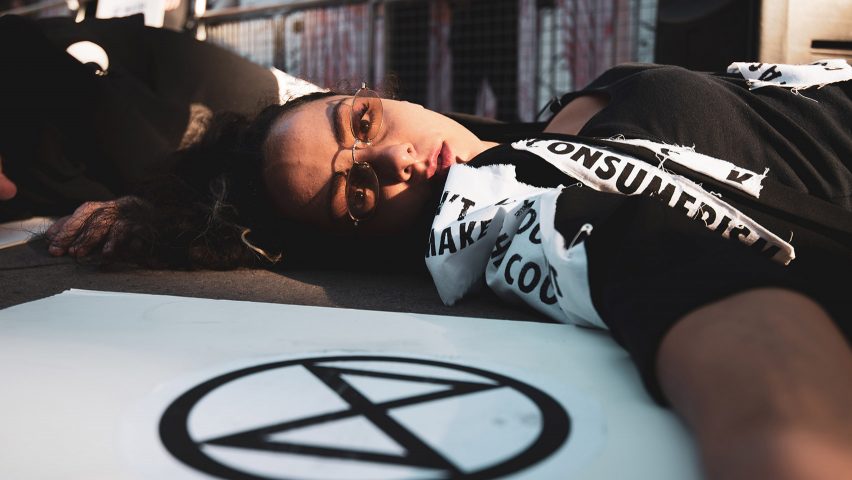Extinction Rebellion staged a funeral march to close London Fashion Week. Dezeen spoke to organiser and activist Sara Arnold about the need to redefine creativity in the climate crisis, rather than making "more stuff".
Last week, climate activist group Extinction Rebellion staged a funeral procession from London's Trafalgar Square to 180 The Strand, London Fashion Week's central hub.
"We need creativity more than ever," Arnold explained to Dezeen in an interview during the protests. "But we definitely need to address what creativity means. And it doesn't mean to create more stuff."
"People have been told for so many years that their power is through their wallets and through consuming. And they've tried it and it hasn't worked," she continued.
Funeral for "the system that has got us here"
For two days, activists laid out red carpets of fake blood, staged die-ins and glued themselves to doors to highlight "the blood on the hands of the fashion industry".
The funeral procession – or death march – was then held on the final day of the fashion event, which ran from 13 to 17 September. The procession was part of a series of demonstrations calling for an end to the biannual fashion event.
Protestors dressed in funeral attire complete with flowers and black veils carried two coffins, emblazoned with the words "Our Future" and "RIP LFW 1983-2019".
According to Arnold, the funeral procession was "a time for people to reflect" although she acknowledges that the industry "won't just shut down overnight".
"If you're really going to take on board the emergency situation that we're in, then at some point you need to grieve," she said. "But [the funeral] was also a way of putting to rest the system that has got us here."
Fashion industry uses huge amount of carbon
Arnold wants people to think about the message though, rather than concentrating on Extinction Rebellion's tactics.
Textile production is currently the world's second most polluting industry after the oil industry, producing over 100 billion items of clothing per year.
According to Arnold, if we carry on business as usual, it's predicted that by 2050 the fashion industry alone will use up 26 per cent of the global carbon budget as stated by the Paris Agreement.
The 2016 agreement was signed by 175 parties and aims to keep the temperature increase this century below two degrees celsius.
"The fashion industry is absolutely not under threat at all," said Arnold. "It is actually set to grow by 63 per cent between now and 2030, with really quite catastrophic consequences."
Arnold previously studied fashion design and says that we need to redefine the meaning of creativity in our current climate.
"I studied fashion design, and the whole course was about making stuff, but maybe we don't need to," the activist told Dezeen. "Everything is up for questioning right now."
Fashion is business disguised as culture
The activist argues that London Fashion Week is a business event that disguises itself as a cultural event. The fashion industry calls itself 'cultural' and 'creative' as a "co-opting tool", according to Arnold.
"What you see is a distraction from the truth – culture is being used to deceive us," she explained. "Essentially, clothes are just clothes – it's fashion that sells the clothes."
The fast fashion industry makes up the majority of the carbon footprint, but the luxury fashion industry – or "so-called 'cultural' sector" – legitimises selling more and more products, and cheaper brands follow suit.
She believes that to be truly cultural, fashion corporations need to use their platform to spread better practice.
"Culture, in a time of crisis, has a responsibility to tell the truth," she said. "The fashion industry, as well as being one of the most polluting is also one of the most influential industries."
"We're really fighting for our survival now, so if you have all that influence you have a duty to use it to get the message out."
"We've extracted enough resources"
According to Arnold, while many designers have good intentions in developing bioplastics and compostable materials, the key is to circulate what we already have rather than produce more.
"Even though I sympathise with all of those that have tried to make the industry sustainable, we have to realise that, given it's now an emergency, we shouldn't be tinkering with the material stuff – that's not going to save us," she explained.
So much damage has already been done by the fashion industry, Arnold argues, that restorative and regenerative action is required, not just attempting to make the garment industry less environmentally destructive.
"We've already got enough stuff out there, we've extracted enough resources from our planet, and we just need to circulate those resources round," she said.
"We need to talk about what is actually going to sustain us for generations to come, rather than what is gonna sustain business as usual," Arnold added.
Earlier this year, RCA graduate Laura Kraup Frandsen refused to present a final collection for her fashion degree, instead staging a die-in with the help of members of Extinction Rebellion.

